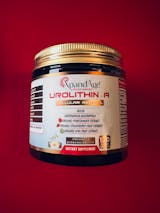I've tried a lot of supplements, but XpandAge Urolithin A formula genuinely surprised me. After about 2 weeks of taking it daily, I noticed a clear uptick in my baseline energy—not jittery or overstimulated, just a more sustained, clean vitality throughout the day.
What really sets this apart is the combo of Urolithin A and Akkermansia—you’re getting support for cellular health and gut health in one formula. It feels like it’s working from the inside out. My digestion feels smoother, and even my post-workout recovery seems faster.
I also appreciate the thoughtfulness of the ingredients: organic pomegranate, prebiotics, no fillers, and it’s all vegan and USA-made. The fact that it includes 120 capsules (a full 40 servings) makes it a great value for a high-end formula like this.
If you're into longevity, mitochondrial health, or gut-brain connection, this is a must-add to your daily routine.
If you are looking for your better gut health, this probiotics blend is for you. It has all the anti-aging ingredients to keep you active. Highly recommended
I’ve tried many probiotics before, but this one feels different. My digestion feels smoother, and I don’t get that heavy bloated feeling anymore. I’m about one month in and really impressed so far.
I’ve been using these Bovine Collagen Peptides Capsules by xpandage life sciences for a few weeks now, and I can confidently say they’re delivering results. My skin feels more hydrated and looks smoother—those fine lines around my eyes are less noticeable. I’ve also seen a big improvement in the strength of my nails and the overall shine of my hair.
What sets this formula apart is the thoughtful combination of collagen with biotin, PABA, and hyaluronic acid. It feels like a complete beauty and wellness supplement. Plus, the added vitamins C, D, zinc, and copper are a great bonus for immune and joint support.
No unpleasant taste or after effects just easy-to-take capsules that truly work from the inside out. Highly recommended for anyone looking to elevate their beauty and health routine naturally.
Not gonna lie, the flavor is bold, but so are the benefits. My hair feels thicker, my nails are growing faster, and my knees aren’t cracking like before. If you’re serious about collagen, this one delivers. Just mix it into a smoothie and you're good to go. Recommend this for sure!










